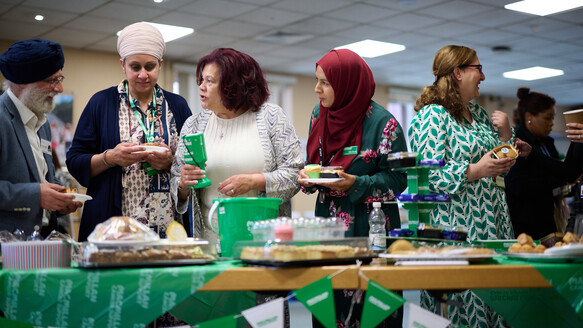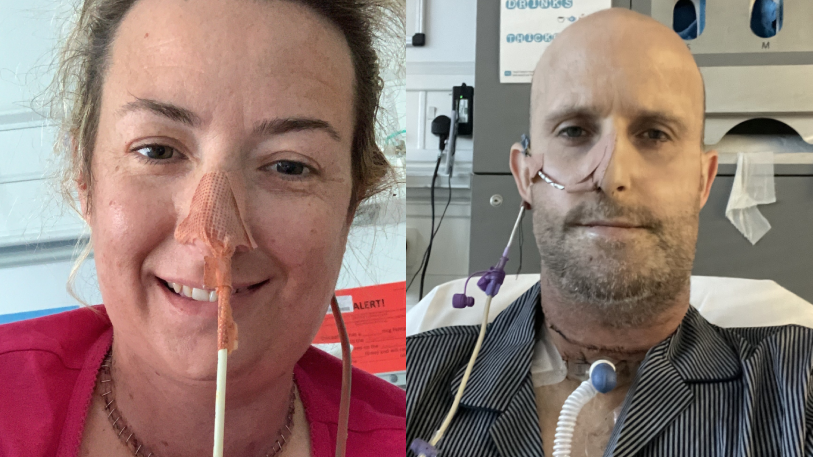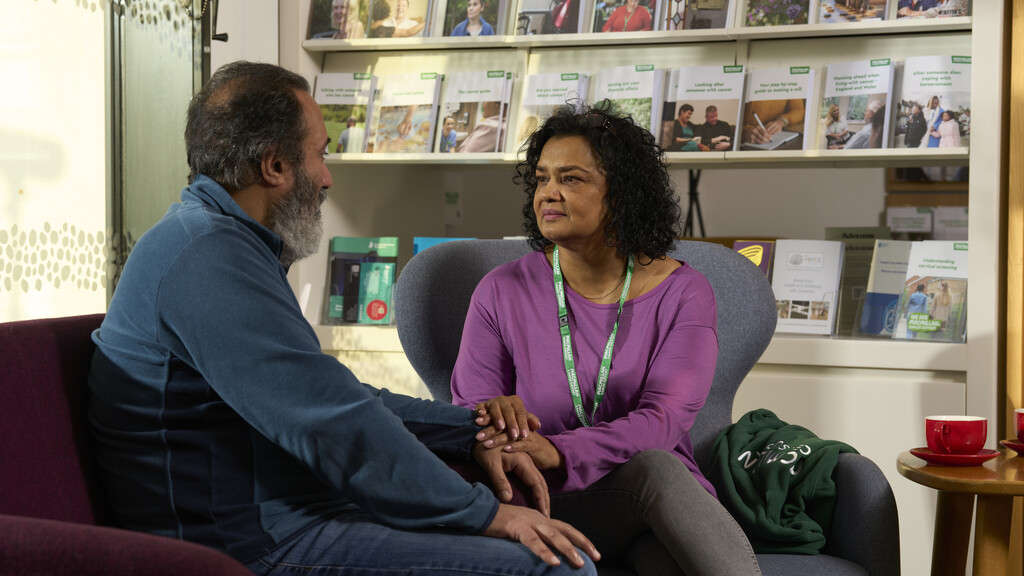People with cancer across the UK have been let down by a ‘cancer postcode lottery’.
New research reveals that 40% of people with cancer in the UK have struggled to access treatment or care because of where they live. More needs to be done to make cancer care fair.
People are struggling to access treatment or care because of where they live
As a GP, it really does worry me that where you live can have such a huge impact on your cancer experience.
Our latest research reveals that 1.4 million people with cancer across the UK have been let down by a ‘cancer postcode lottery’. That is 40% of people with cancer in the UK being left behind, struggling to get the treatment and care that's right for them simply because of where they live[i]
Such inconsistent cancer care is leaving some people with cancer with fewer treatment options, or very little choice but to travel long distances for the treatment they need[ii] Many people face increased costs, stress, anxiety and exhaustion as a result[iii].
And at its most extreme, the UK’s ‘cancer postcode lottery’ could be putting an estimated 100,000 lives at risk – with our latest survey showing that 3% of people with cancer have had to turn down critical cancer tests and treatment simply because they lived too far away[iv].
We also found that if cancer waiting times were as good everywhere in the UK as they are in the best areas, then around 60,000 more people each year would get the treatment they need, when they need it[v].
For too many people, the harsh reality is that cancer care is beginning to feel like a game of chance – a ‘flip of a coin’ or the need to be ‘in the right place, at the right time’ when it comes to getting the treatment and care they so desperately need.
Variations in treatment and care for head and neck cancer
Our latest survey reveals that 54% of people with head and neck cancer have been affected by variations in cancer treatment and care. This is significantly higher than the average for people with cancer[vi].
While newer treatments for head and neck cancer such as robotic surgery might not be the right option for everyone, they should be made available for those who would benefit.
Lisa shares her experience of robotic surgery
Lisa Martin, 45, from Lancashire was diagnosed with head and neck cancer in 2018 and was one of the ‘lucky few’ able to benefit from robotic surgery.
“All I can say is that I was in the right place, at the right time and was given the option to explore robotic surgery – without that, I don’t think I would still be here today.
“My treatment took 45 minutes, helping me to avoid hours of radical surgery and so many of its life-changing and life-long side effects. Without it I could’ve lost my teeth, had no saliva for life, lost a lot of feeling in my face and I might’ve had to live my life being fed through a tube.
“I know the treatment I received might not be the best medical option for everyone, but I do believe that everyone with cancer should at least have the same access to all the possibilities that exist in cancer care. Where you live should never limit what is available to you.”
Shaun had surgery for head and neck cancer
Shaun Donnelly, 38, from Strabane in Northern Ireland, underwent traditional and invasive surgery for head and neck cancer in 2025.
“After discussing my treatment, a potential 18-hour surgery involving removing part of my jaw and rebuilding it using bone from my leg, I realised how serious it was and was grateful for the experience and skill of the team I was under.
“This treatment was the only option available to me, and I’d never even heard of robotic surgery until recently. The experience has had a big impact on my life. The structure of my jaw has changed, so my ability to chew will never be the same. Additionally, the nerves in that area have been removed, so something as simple as a kiss with your partner is different now. We jokingly call them 50% kisses as I only feel on my top lip, but I am so grateful to be here. 50% kisses beat no kisses any day of the week.”
More needs to be done to make cancer care fair
More urgently needs to be done to make cancer care fair. And Macmillan wants to play our part in helping to achieve that.
Only recently we teamed up with AstraZeneca to look at biomarker testing – a type of cancer testing that can make cancer treatment much more precise. We found widespread variation across the UK in how quickly people got their results. That single inconsistency could spell the difference between one person getting highly effective cancer treatment, and another starting a form of treatment that may never even work for them. We will now be continuing that work to help deliver solutions that will help improve the situation across the UK.
Variation ultimately means that while one person may be treated on time, another may face months of anxious delays. That one person might easily access the treatment and care they need, while another may have to turn down vital cancer tests and treatment and put their lives at risk simply because they live too far away.
This is affecting people’s experience of cancer care and, in some cases, the outcomes that can be achieved for them. This is unacceptable, but it is fixable.
At Macmillan, our aim is to bring UK decision-makers, people with cancer and local communities together to make sure that well-established cancer treatments and tests are made equally available to everyone.
We need to see urgent action to make cancer care fair. No-one should get left behind simply because of where they live. Everyone deserves the best the UK has to offer, and we are on a mission to make this a reality.
And we want you to join us. Sign our pledge to demand fairer cancer care for everyone, no matter their postcode.
Support if you are worried about cancer
Information about cancer
Talk to someone about cancer
You may also find it helpful to talk to someone about your concerns. You can:
- Call the Macmillan Support Line for free on 0808 808 00 00.
- Chat to our specialists online.
References
- [i] Macmillan Cancer Support/YouGov survey of 2,002 adults in the UK who have had a cancer diagnosis. Fieldwork was undertaken between 30th May and 24th June 2025. The survey was carried out online. The figures have been weighted and are representative of people living with cancer in the UK (aged 18+). Survey question was as follows: “For each of the following statements, please state whether you have experienced this or not in relation to your cancer tests or treatment.” Answer options were as follows: Had to travel for an hour or more to have a test or scan; Had to travel for an hour or more to have treatment; Found out from a friend/family about other types of test or treatments for your cancer that are only offered in another part of the UK; Had to ask repeatedly to get a particular test or treatment that is not available in your local area. By local area we mean the area where you live; Considered not having a test or treatment because of the travel time; Had to turn down a test or treatment because of the travel time; Chose to travel to a hospital more than an hour away because it had shorter waiting times; Chose to travel to a hospital more than an hour away because it had better treatment options. 40% of respondents selected one or more of these options. ‘Almost 1.4 million’ figure estimated by applying the 40% figure to the 3.4 million people living with cancer in the UK, sourced from: Macmillan Cancer Support. Cancer prevalence. Accessed July 2025
- [ii] As per ref 1. Survey question was as follows: “For each of the following statements, please state whether you have experienced this or not in relation to your cancer tests or treatment.” Relevant options referenced here: Had to travel for an hour or more to have a test or scan; Had to travel for an hour or more to have treatment. 36% of people with cancer selected one or both of these options.
- [iii] As per ref 1. Survey question was as follows: “You said you have had one or more experiences in relation to the availability of cancer tests or treatment in your local area. Which, if any, of the following impacts have these experiences had on you personally?” Answer options included: Increased costs from travel or accommodation; Additional worry, stress or anxiety; Loss of income from having to take more time off work; Caused difficulties with my caring responsibilities, e.g. looking after children, elderly relatives or other dependents; I received a better test or treatment for my cancer; I received a lower quality test or treatment for my cancer; Loss of confidence in the NHS; It's taken up time and energy; It's caused exhaustion or worsened fatigue. Re-basing onto the total survey sample shows that around one in six (16%) people with cancer have experienced additional worry, stress and anxiety as a result of local variation in treatment, and around one in eight (12%) have experienced exhaustion or worsened fatigue.
- [iv] As per ref 1. Relevant option referenced here: Had to turn down a test or treatment because of the travel time. 3% of respondents selected this option. 100k figure estimated as per ref 1 by applying the 3% to the 3.4 million people living with cancer in the UK.
- [v] v Macmillan Cancer Support analysis of cancer waiting times 62-day standards for each UK nation between April 2024 and March 2025. During this time, an additional 53,968 people with cancer in England would have started first treatment within 62 days of urgent referral if all Sub-ICBs matched the 84.8% performance reported for NHS West Yorkshire ICB (02T). An additional 3,908 people with cancer in Scotland would have started first treatment within 62 days of urgent suspicion of cancer referral if all Health Boards matched the 94.3% performance reported for NHS Lanarkshire. An additional 2,013 people with cancer in Wales would have started first definitive treatment within 62 days of suspicion of cancer if all Local Health Boards matched the 67.4% performance reported for Cardiff and Vale UHB. An additional 291 people with cancer in Northern Ireland would have started first definitive treatment within 62 days of an urgent referred with suspected cancer if all Health and Social Care Trusts matched the 40.5% performance reported for Western HSCT.
Sources for 62-day standards data: NHS England. Cancer waiting times – provider-based data extracts; Public Health Scotland. Cancer waiting times – 1 January to 31 March 2025; StatsWales. Suspected Cancer Pathways data; Northern Ireland Department of Health. Cancer waiting times. All accessed July 2025. - [vi] As per ref 1. Survey included 60 people living with head and neck cancer.
Read more
-
News and stories 10 Sep 2025In this blog, Gemma reflects on the impact Macmillan made last year ahead of the launch of Macmillan Cancer Support's Annual Report for 2024.
-
News and stories 03 Sep 2025Anthony Cunliffe, National Lead Medical Adviser at Macmillan, explains why more needs to be done to make cancer care fair.
-
News and stories 10 Jul 2025The Prime Minister launched the government’s long-awaited 10 Year Health Plan, outlining a vision to “bring the NHS closer to home.”






